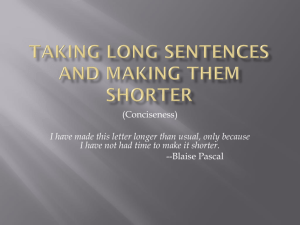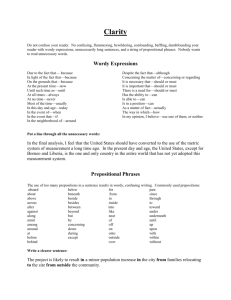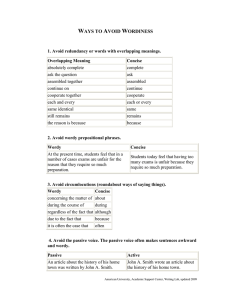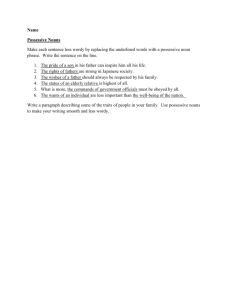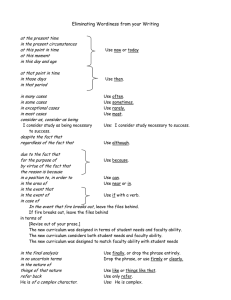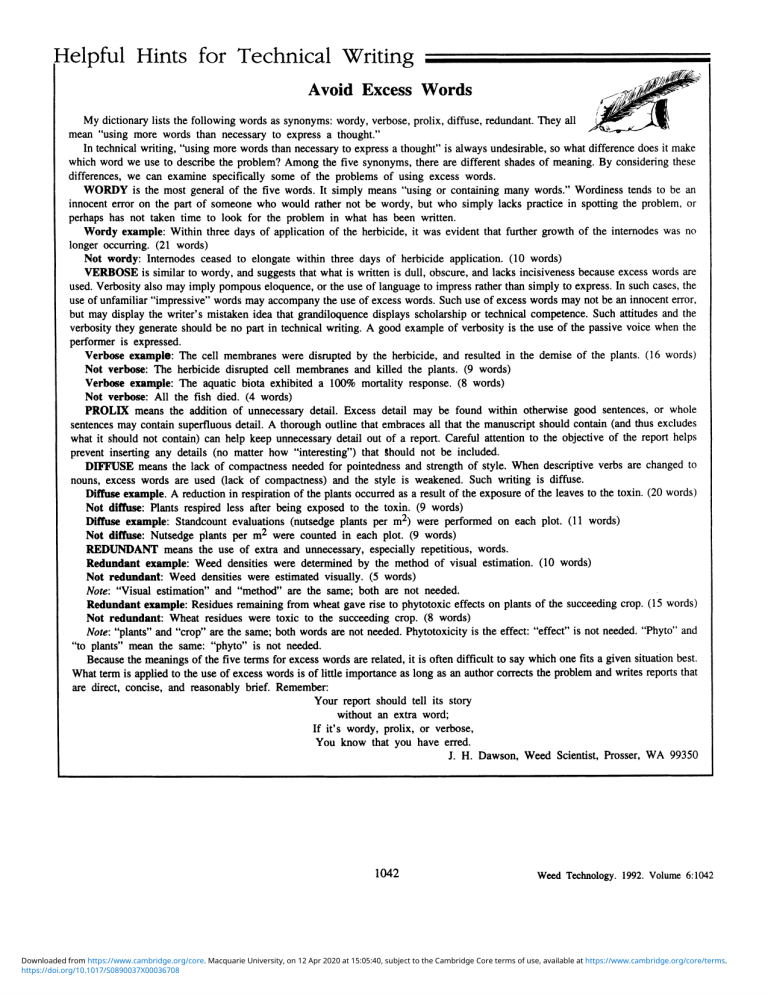
Helpful Hints for Technical Writing -=========1 Avoid Excess Words My dictionary lists the following words as synonyms: wordy, verbose, prolix, diffuse, redundant. They all mean "using more words than necessary to express a thought." In technical writing, "using more words than necessary to express a thought" is always undesirable, so what difference does it make which word we use to describe the problem? Among the five synonyms, there are different shades of meaning. By considering these differences, we can examine specifically some of the problems of using excess words. W O R D Y is the most general of the five words. It simply means "using or containing many words." Wordiness tends to be an innocent error on the part o f someone who would rather not be wordy, but who simply lacks practice in spotting the problem, or perhaps has not taken time to look for the problem in what has been written. Wordy example: Within three days of application of the herbicide, it was evident that further growth of the internodes was no longer occurring. (21 words) Not wordy: Internodes ceased to elongate within three days of herbicide application. (10 words) VERBOSE is similar to wordy, and suggests that what is written is dull, obscure, and lacks incisiveness because excess words are used. Verbosity also may imply pompous eloquence, or the use of language to impress rather than simply to express. In such cases, the use of unfamiliar "impressive" words may accompany the use of excess words. Such use of excess words may not be an innocent error, but may display the writer's mistaken idea that grandiloquence displays scholarship or technical competence. Such attitudes and the verbosity they generate should be no part in technical writing. A good example of verbosity is the use o f the passive voice when the performer is expressed. Verbose example: The cell membranes were disrupted by the herbicide, and resulted in the demise of the plants. (16 words) Not verbose: The herbicide disrupted cell membranes and killed the plants. (9 words) Verbose example: The aquatic biota exhibited a 100% mortality response. (8 words) Not verbose: A l l the fish died. (4 words) PROLIX means the addition of unnecessary detail. Excess detail may be found within otherwise good sentences, or whole sentences may contain superfluous detail. A thorough outline that embraces all that the manuscript should contain (and thus excludes what it should not contain) can help keep unnecessary detail out o f a report. Careful attention to the objective of the report helps prevent insetting any details (no matter how "interesting") that Should not be included. DIFFUSE means the lack of compactness needed for pointedness and strength of style. When descriptive verbs are changed to nouns, excess words are used (lack o f compactness) and the style is weakened. Such writing is diffuse. Diffate example. A reduction in respiration of the plants occurred as a result of the exposure o f the leaves to the toxin. (20 words) Not diffase: Hants respired less after being exposed to the toxin. (9 words) Diffuse example: Standcount evaluations (nutsedge plants per m ) were performed on each plot. (11 words) Not diffase: Nutsedge plants per m were counted in each plot. (9 words) REDUNDANT means the use of extra and unnecessary, especially repetitious, words. Redundant example: Weed densities were determined by the method of visual estimation. (10 words) Not redundant: Weed densities were estimated visually. (5 words) Note: "Visual estimation" and "method" are the same; both are not needed. Redundant example: Residues remaining from wheat gave rise to phytotoxic effects on plants o f the succeeding crop. (15 words) Not redundant: Wheat residues were toxic to the succeeding crop. (8 words) Note: "plants" and "crop" are the same; both words are not needed. Phytotoxicity is the effect: "effect" is not needed. "Phyto" and "to plants" mean the same: "phyto" is not needed. Because the meanings of the five terms for excess words are related, it is often difficult to say which one fits a given situation best. What term is applied to the use of excess words is of little importance as long as an author corrects the problem and writes reports that are direct, concise, and reasonably brief. Remember: Your report should tell its story without an extra word; If it's wordy, prolix, or verbose, You know that you have erred. J. H. Dawson, Weed Scientist, Prosser, W A 99350 1 2 2 1042 Weed Technology. 1992. Volume 6:1042 Downloaded from https://www.cambridge.org/core. Macquarie University, on 12 Apr 2020 at 15:05:40, subject to the Cambridge Core terms of use, available at https://www.cambridge.org/core/terms. https://doi.org/10.1017/S0890037X00036708
